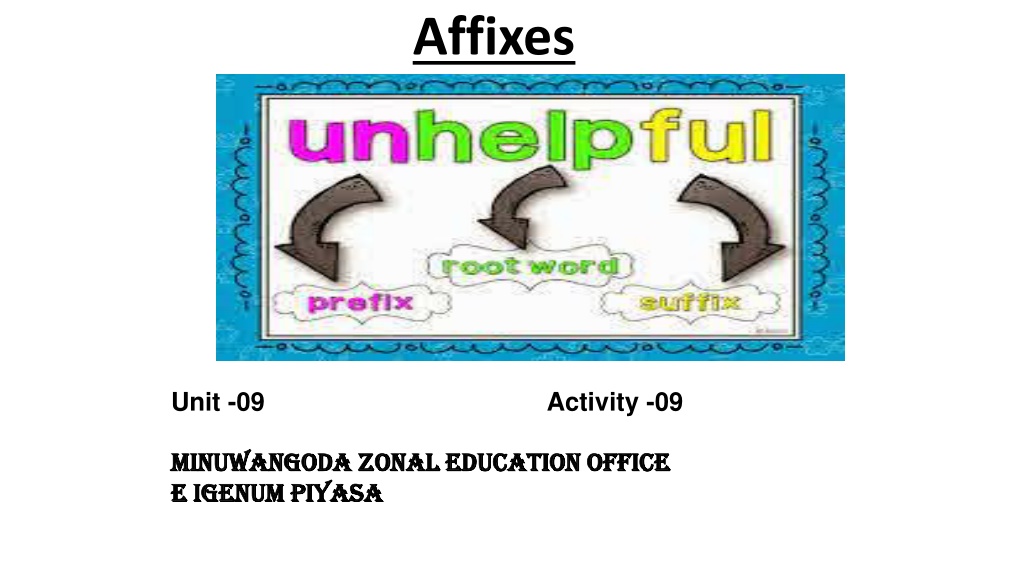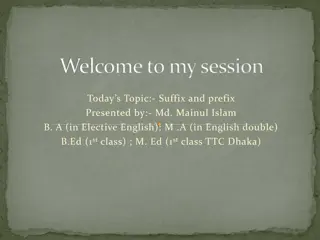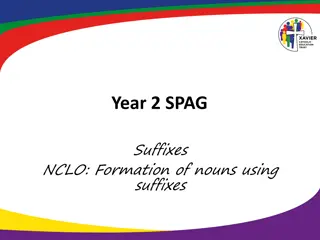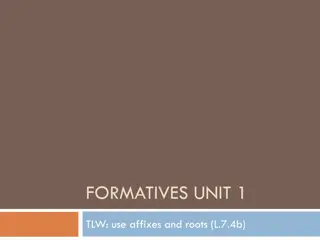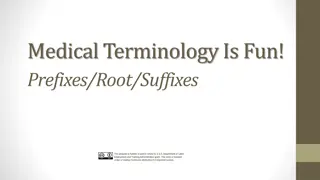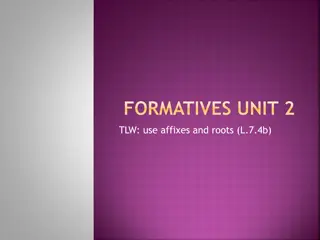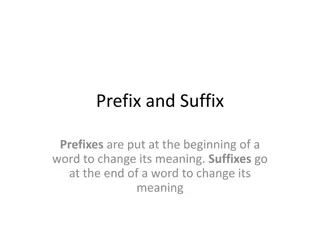Understanding Affixes: Prefixes and Suffixes in English Vocabulary
Affixes are essential elements in vocabulary building, with prefixes added to the front of words and suffixes to the back, altering meanings or grammatical functions. Learn about the role and examples of prefixes and suffixes, and practice creating new words by combining roots with affixes to enhance your word knowledge in English.
Download Presentation

Please find below an Image/Link to download the presentation.
The content on the website is provided AS IS for your information and personal use only. It may not be sold, licensed, or shared on other websites without obtaining consent from the author. Download presentation by click this link. If you encounter any issues during the download, it is possible that the publisher has removed the file from their server.
E N D
Presentation Transcript
Affixes Unit -09 Activity -09 Minuwangoda Zonal Education Office Minuwangoda Zonal Education Office E Igenum Piyasa E Igenum Piyasa
What are affixes? An affix is added to the root of a word to change its meaning. An affix added to the front of a word is known as a prefix. One added to the back is known as a suffix. impassable suffix prefix Affix Affix
What are prefixes? A prefix is placed at the beginning of a word to modify or change its meaning. Prefixes change the word meanings. a + sleep - asleep anti + body - antibody auto + mobile - automobile in + correct - incorrect un + happy im + proper il + legal co +exist dis + continue ir + regular macro + economics mis + behave mal + practice over _+ heat pre + school
sub+ marine super + market re + do un + cover vice + president tri + cycle non+ fat
What are suffixes? A suffix is a letter or a group of letters added to the end of a word to alter its meaning or to ensure it fits grammatically into change its word class. Joy (n) + ous - joyous (n) tender (adj) + ness - tenderness(n) person (n) + al -personal (adj) comfort (n) + able - comfortable (adj) want (v) + ed - wanted (v) sing (v) + ing - singing (v progressive) gold (n) + en - golden (adj) nice (adj) + er - nicer (adj com) great (adj) +est - greatest (adj.sup) cup (n) + ful - cupful (adj)
fear (n) + less - fearless (adj) humane (n) + ity - humanity (n) attract (n) + tion - attraction (n) neat (adj) + ly - neatly (adv) enjoy (v) + ment - enjoyment (n) fox (nS) + es - foxes (nP) expand (v) + sion - expansion (n) prevent (v) + tion - prevention (n) nation (n) + al - national (adj)
Put the words in brackets to form new words. You will have to use prefixes or suffixes 1.He was sitting ..in the train. (comfort) 2. He was acting in a very .way. ( child) 3. The word is difficult to pronounce. So it is ..(pronounced) 4. He has lost his book .I do not know where he has .(place) 5. You should not have done that. It was very of you . (think) 6.He did not pass the exam .He was .in the second time. (success) 7. Some of the shanty towns are dreadfully (crowd) 8. The team was able to win the (champion) 9. I could not find any . in his writing. (weak)
10. He wanted to be a ..when he grew up. (Mathematics) 11. The road was very narrow. So, they had to ..it. (wide) 12.He was accused of .documents. (false) 13. He needed to .the temperature. (regular) 14. There were .of people at the match. (hand) 15. He decided to study .at the university. (journal) 16. The company provides over 1000 .(employ) 17. The film was terrible. I felt really .(bore) 18. The film was ..(bore)
